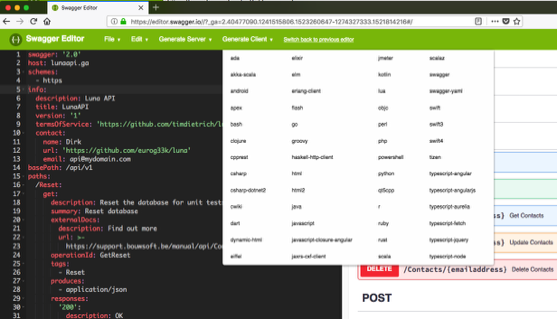Publish Swagger (OpenAPI 2.0) Documentation
Luna API
Write, Document, Publish
Use swagger editor to generate client code
The developers that consume your api can use the swagger editor (either you host this yourself https://swagger.io/docs/swagger-tools/#swagger-editor, or you use the public swagger editor http://editor.swagger.io/) to generate client code to access your api in the language of their choice.
If you want to allow the use of the public editor, don't forget to allow the public swagger site in your Luna CORS AccessControlAllowOrigin settings.
If you do not want to allow the swagger domain to access your API directly, you can just access the swagger.json document straight from the api e.g. https://www.lunaapi.ga/api/v1/swagger.json and then copy-paste the content in the swagger editor on the swagger.io website.

Supported languages/frameworks for the API clients: ActionScript, Ada, Apex, Bash, C# (.net 2.0, 3.5 or later), C++ (cpprest, Qt5, Tizen), Clojure, Dart, Elixir, Elm, Eiffel, Erlang, Go, Groovy, Haskell (http-client, Servant), Java (Jersey1.x, Jersey2.x, OkHttp, Retrofit1.x, Retrofit2.x, Feign, RestTemplate, RESTEasy, Vertx, Google API Client Library for Java, Rest-assured), Kotlin, Lua, Node.js (ES5, ES6, AngularJS with Google Closure Compiler annotations) Objective-C, Perl, PHP, PowerShell, Python, R, Ruby, Rust (rust, rust-server), Scala (akka, http4s, swagger-async-httpclient), Swift (2.x, 3.x, 4.x), Typescript (Angular1.x, Angular2.x, Fetch, jQuery, Node)